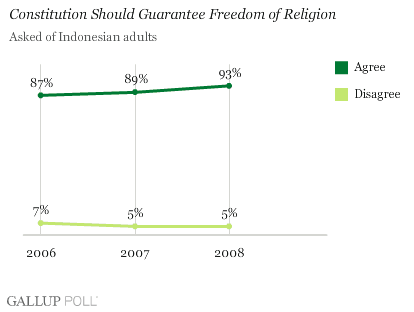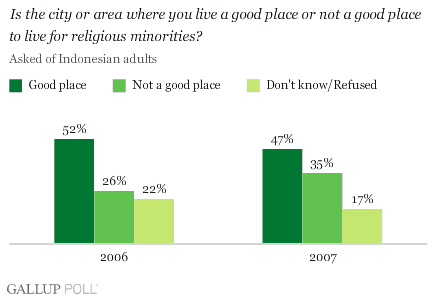WASHINGTON, D.C. -- The Indonesian government's decision last week to restrict members of a minority Muslim sect from practicing their faith may be at odds with the country's constitution and the ideals of many of its residents, who overwhelmingly support the right for people to observe any religion and practice its teachings and beliefs.

In each of the three recent surveys Gallup has conducted in Indonesia, roughly 9 in 10 respondents have said that if they were asked to help draft a constitution for a new country, they would probably support a provision for freedom of religion. These sentiments are in line with the country's constitution, which explicitly guarantees all persons "the freedom of worship, each according to his/her own religion or belief."
In Indonesia, the world's largest predominantly Muslim country, residents' views are roughly on par with, or higher than what Gallup has observed in several predominantly Muslim countries in Asia. Indonesians are as likely as Bangladeshis and Malaysians to support provisions for religious freedom, and more likely than either Pakistanis or Afghans to express support.
Climate for Religious Minorities
The government decree restricting the religious activities of the minority Ahmadiyya sect, regarded as heretical and non-Muslim by many Muslims, has sparked concern about the future of religious freedom and existing religious tensions in a country that is home to sizable Christian, Hindu, and Buddhist populations.
In the past decade, Indonesians have witnessed large- and small-scale violence between Muslims and Christians and rising militant Islamist activity. Given this history and current tensions, it is perhaps understandable why only about half of Indonesians surveyed in 2006 and 2007 (Gallup did not ask the question in 2008) said their communities were good places for religious minorities to live.

Bottom Line
Under pressure from hard-line Islamic groups to ban the sect, the government instead issued the decree, which clearly displeased Indonesian Muslims on both sides. On the one hand, moderates, who represent a majority of Indonesians, have criticized the government for getting involved and violating the constitution. On the other hand, hardliners are still demanding that the government ban the sect and are threatening violence. On Wednesday, thousands of protesters, some reportedly carrying banners that read "Maintain sharia, disband Ahmadiyya" took to the streets in Jakarta. And on Thursday, crowds sealed off Ahmadiyya schools and mosques.
Some observers at home and abroad perceive the government's intervention in the matter as pandering to hard-line Islamic parties ahead of an election year. If so, judging from the high percentages of Indonesians who champion religious freedom as a constitutional right, and the dissatisfaction among moderates and hardliners with the decree, the government may jeopardize its support from both.
Survey Methods
Results are based on face-to-face interviews with approximately 1,000 adults living in Indonesia, aged 15 and older, conducted in August 2006, April 2007, and March 2008, and in Bangladesh, Pakistan, Afghanistan, and Malaysia in 2006 and 2007. For results based on the total sample of adults, one can say with 95% confidence that the maximum margin of sampling error is ±3 percentage points. In addition to sampling error, question wording and practical difficulties in conducting surveys can introduce error or bias into the findings of public opinion polls.